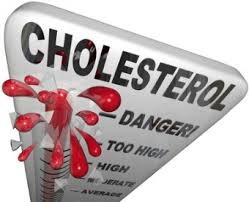What you eat. Eating too
much saturated fat, trans fat, and cholesterol can cause high cholesterol.
Saturated fat and cholesterol are in foods that come from animals, such as
meats, whole milk, egg yolks, butter, and cheese.
Trans fat is found in fried foods and packaged foods, such as cookies,
crackers, and chips.
Your weight. Being overweight may increase triglycerides and decrease HDL (good
cholesterol).
Your activity level. Lack of physical activity can lower your HDL.
Your age and gender. After you reach age 20, your cholesterol naturally begins
to rise.
In men, cholesterol generally levels off after age 50.
In women, it stays fairly low until menopause. Then it rises to about the same
level as in men.
Some diseases. Certain diseases may raise your risk of high cholesterol. These
include hypothyroidism, chronic kidney disease, and some types of liver
disease.
Your family history. High cholesterol may run in your family. If family members
have or had high cholesterol, you may also have it.
Cigarette smoking. Smoking can lower your HDL cholesterol.
Certain medicines. Some medicines can raise triglyceride levels and lower HDL
(good) cholesterol levels. These medicines include thiazide diuretics,
beta-blockers, estrogen, and corticosteroids.



 Contact Us
Contact Us






 Hospitals
Hospitals
 Doctors
Doctors
 Diagnostic
Diagnostic
 Pharmacy
Pharmacy
 Health Tips
Health Tips
 Blog
Blog

























Comments